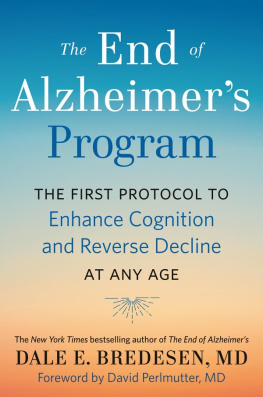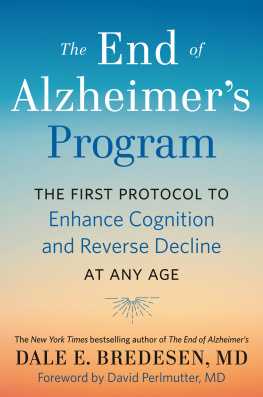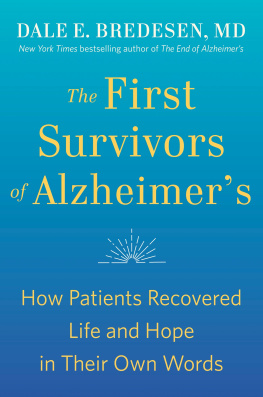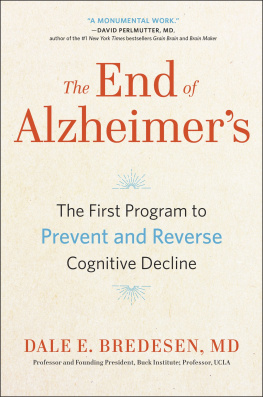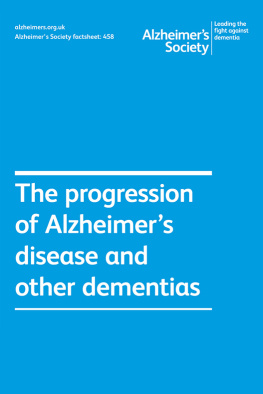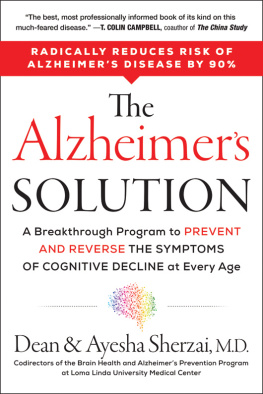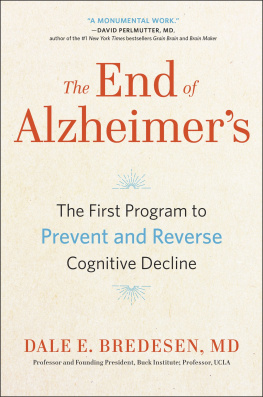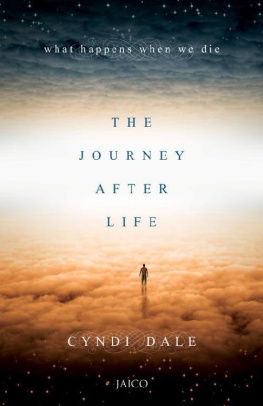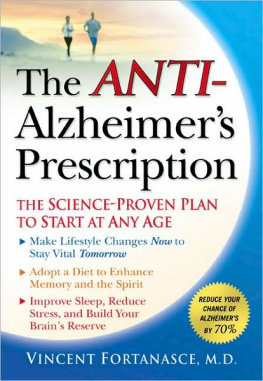Dale Bredesen - The End of Alzheimers Program
Here you can read online Dale Bredesen - The End of Alzheimers Program full text of the book (entire story) in english for free. Download pdf and epub, get meaning, cover and reviews about this ebook. year: 2020, publisher: Penguin Publishing Group, genre: Romance novel. Description of the work, (preface) as well as reviews are available. Best literature library LitArk.com created for fans of good reading and offers a wide selection of genres:
Romance novel
Science fiction
Adventure
Detective
Science
History
Home and family
Prose
Art
Politics
Computer
Non-fiction
Religion
Business
Children
Humor
Choose a favorite category and find really read worthwhile books. Enjoy immersion in the world of imagination, feel the emotions of the characters or learn something new for yourself, make an fascinating discovery.
- Book:The End of Alzheimers Program
- Author:
- Publisher:Penguin Publishing Group
- Genre:
- Year:2020
- Rating:5 / 5
- Favourites:Add to favourites
- Your mark:
- 100
- 1
- 2
- 3
- 4
- 5
The End of Alzheimers Program: summary, description and annotation
We offer to read an annotation, description, summary or preface (depends on what the author of the book "The End of Alzheimers Program" wrote himself). If you haven't found the necessary information about the book — write in the comments, we will try to find it.
The End of Alzheimers Program — read online for free the complete book (whole text) full work
Below is the text of the book, divided by pages. System saving the place of the last page read, allows you to conveniently read the book "The End of Alzheimers Program" online for free, without having to search again every time where you left off. Put a bookmark, and you can go to the page where you finished reading at any time.
Font size:
Interval:
Bookmark:


An imprint of Penguin Random House LLC
penguinrandomhouse.com
Copyright 2020 by Dale E. Bredesen
Penguin supports copyright. Copyright fuels creativity, encourages diverse voices, promotes free speech, and creates a vibrant culture. Thank you for buying an authorized edition of this book and for complying with copyright laws by not reproducing, scanning, or distributing any part of it in any form without permission. You are supporting writers and allowing Penguin to continue to publish books for every reader.
Library of Congress Cataloging-in-Publication Data
Names: Bredesen, Dale E., author.
Title: The end of alzheimers program: the first protocol to enhance
cognition and reverse decline at any age / Dale E. Bredesen, M.D.
Description: New York: Avery, an imprint of Penguin Random House LLC, [2020] | Includes index.
Identifiers: LCCN 2020000690 | ISBN 9780525538493 (hardcover) | ISBN 9780525538509 (ebook)
Subjects: LCSH: Alzheimers diseasePrevention. | Alzheimers diseaseTreatment.
Classification: LCC RC523.2 .B735 2020 | DDC 616.8/311--dc23
LC record available at https://lccn.loc.gov/2020000690
Illustrations by Joe LeMonnier
Neither the publisher nor the author is engaged in rendering professional advice or services to the individual reader. The ideas, procedures, and suggestions contained in this book are not intended as a substitute for consulting with your physician. All matters regarding your health require medical supervision. Neither the author nor the publisher shall be liable or responsible for any loss or damage allegedly arising from any information or suggestion in this book.
pid_prh_5.5.0_c0_r0
This book is dedicated to Julie G. and the 3,000+ members of ApoE4.Info, who embrace the twenty-first-century approach to health and are together offering hope to the more than one billion people at high risk for Alzheimers disease worldwide.Contents

Visit endofalzheimersprogram.com to see every reference in this book.
Foreword

At every crossway on the road that leads to the future, each progressive spirit is opposed by a thousand men assigned to guard the past.
MAURICE MAETERLINCK
N EVER BEFORE HAS THE practice of medicine been as polarized by the dichotomy between reductionism and holism as exists today with relation to the treatment of Alzheimers disease.
Reductionism, as it is applied to the practice of medicine, takes the position that in order to best understand a disease process and ultimately formulate and implement an appropriate therapeutic intervention, both the disease and the intervention need to be reduced to the simplest operative parts and mechanisms. Many have credited the sixteenth-century French philosopher Ren Descartes with codifying this paradigm. Descartes, in part V of his Discourse , described the world as being nothing more than a clockwork machine that could be understood in its entirety through an exploration of its individual components. And clearly the progress of the science of medicine historically and in the present is deeply punctuated by landmark advances characterized by dedication to this approach.
Whether we are speaking of Antonie Philips van Leeuwenhoek, using a single-lensed microscope to discover animalcules (microbes), or the sequencing of the human genome, the underpinnings of Western medicine continue to honor the notion that looking deeper and deeper at constituent parts will ultimately provide a knowledge base that will reveal sought-after solutions to challenging disease processes.
To be sure, microscopy led to an understanding of pathophysiology that directly resulted in wondrous advances leveraged for salubrious outcomes. But myopically engaging a philosophy centered on drilling down to unity in terms of parts and processes inevitably segues to sanctioning a therapy equally centered on the validation of the singular. Simply stated, embracing reductionism in medicine supports the ideology of monotherapy, the idea that the goal of modern medical research should be the development of single, magic bullets that are designed and marketed to counter single diseases.
As Harvard physician Dr. Andrew Ahn put it in a paper exploring the limits of reductionism in medicine:
Reductionism pervades the medical sciences and affects the way we diagnose, treat, and prevent diseases. While it has been responsible for tremendous successes in modern medicine, there are limits to reductionism, and an alternative explanation must be sought to complement it.As of this writing, no disease process highlights the limitations of a reductionist approach as it relates to therapy more than senile dementia of the Alzheimers type. To be sure, the deep dive to unravel the etiology of this now-epidemic disease has been under way for decades and underwritten by hundreds of millions of dollars. Applying a reductionist approach has indeed revealed fascinating mechanisms that are likely involved in what ultimately manifests as this disease that now affects 5.5 million Americans. But alas, no single or combination pharmaceutical therapy has any effect whatsoever on modifying the inexorable course of Alzheimers disease.
As a testament to the tenacity of the pharmaceutical industry, several drugs are marketed to Americans and indeed globally with the idea that they somehow treat Alzheimers disease. But while these medicines may minimally affect Alzheimers symptoms , again they provide no benefit whatsoever with respect to actually improving the ultimate outcome. As Dr. Michal Schnaider-Beeri recently revealed in an editorial in the journal Neurology : Despite great scientific efforts to find treatments for Alzheimer disease (AD), only 5 medications are marketed, with limited beneficial effects on symptoms, on a limited proportion of patients, without modification of the disease course.
More recently, the concern for the lack of efficacy of these medications was overshadowed by a report appearing in The Journal of the American Medical Association revealing that not only do the commonly prescribed Alzheimers drugs lack efficacy, but their utilization is actually associated with more rapid cognitive decline .
In contradistinction to reductionism, holism places more value on exploring the forest as opposed to focusing on the single tree. To be sure, a holistic approach to health and disease absolutely embraces the discoveries of deep scientific pursuits, but the fundamental difference in comparison to reductionism is found when examining how science is utilized as it relates to actually treating a malady. Whereas reductionism looks for the one home-run solution, holism considers any and all options available if theres something positive to offer.
As you will soon discover in the pages that follow, for the first time ever a therapeutic intervention has been developed that successfully treats Alzheimers disease. The protocol developed by Dr. Bredesen is by definition holistic. His program incorporates the discoveries of research across a multitude of disciplines that have bearing on Alzheimers pathogenesis. Our most highly respected scientific research has clearly delineated the specific mechanisms whereby a vast array of seemingly unrelated processes contributes to the ultimate manifestation of this disease. And it is precisely because Alzheimers disease manifests from the confluence of multiple factors that its remediation requires the orchestration of diverse instruments.
Next pageFont size:
Interval:
Bookmark:
Similar books «The End of Alzheimers Program»
Look at similar books to The End of Alzheimers Program. We have selected literature similar in name and meaning in the hope of providing readers with more options to find new, interesting, not yet read works.
Discussion, reviews of the book The End of Alzheimers Program and just readers' own opinions. Leave your comments, write what you think about the work, its meaning or the main characters. Specify what exactly you liked and what you didn't like, and why you think so.

